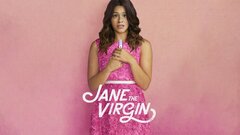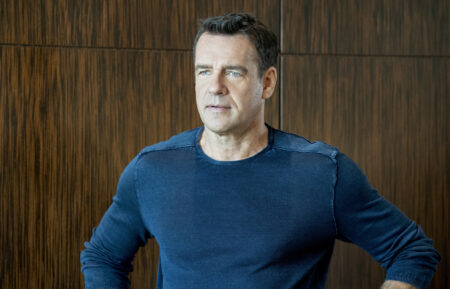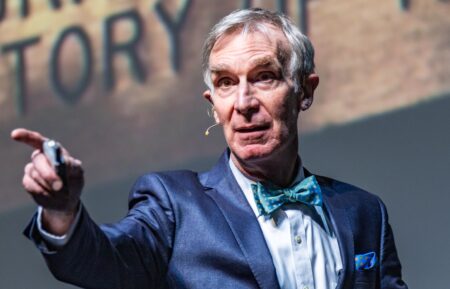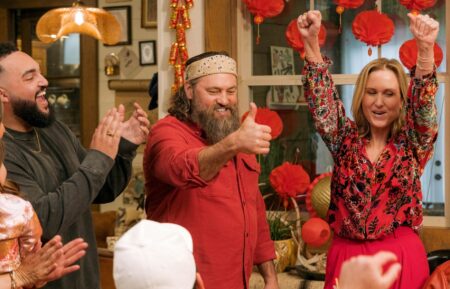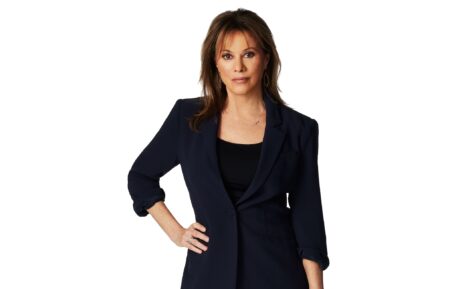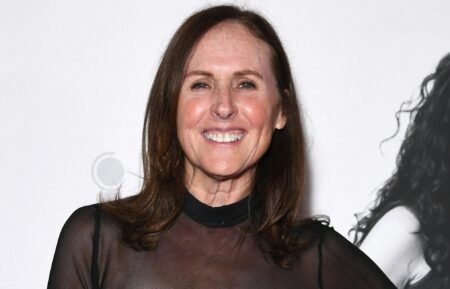‘Jane the Virgin’s Justin Baldoni on Bringing His Passion Project, ‘My Last Days’, to The CW
![Justin BTS 001[3]](https://www.tvinsider.com/wp-content/uploads/2016/08/Justin-BTS-0013-1014x570.jpg)
Before Justin Baldoni became known as hotel owner Rafael on The CW’s Jane the Virgin, he created My Last Days, a heartfelt, inspiring docuseries about people living with terminal illnesses.
After the first season ran online (it’s available to stream here), The CW is airing the second season, featuring new subjects, over a three-night period beginning August 17.
Baldoni shares the journey to bring the series to television, the message he hopes viewers take from it and more.
What inspired you to start My Last Days?
About four years ago, I had left acting; I was a commercial director at the time. I had been doing music videos for years. I really felt like I wanted to be of service in a way I didn’t think I could as an actor. Also, acting had gotten very slow for me.
I was also on a soul search, trying to figure out who I was, what my purpose was here. I had a lot of personal experiences with death, and very close family members who had passed away. I’ll never forget holding my uncle’s hand as he took his last breath. Some very beautiful things happened in that moment, and it made me think about my own mortality; all of our mortality. We tend to think we’re invincible, especially young people. So, when I was doing these commercials and music videos, this idea hit me: I came up with the idea for My Last Days, which was basically a documentary season we would do online. The goal was to try and help people remember how important life is by introducing them to unique people who were living positively while facing terminal illness.
I called my friend Rainn Wilson and my buddies at Soul Pancake, and I said, “I know you guys are looking for content to start your YouTube channel. Do you want to do this with me?” They said, “It’s absolutely crazy, but this is perfect, let’s try it.” Everybody thought no one would watch a show like this. It broke every single rule about YouTube: it wasn’t super fun; it wasn’t cutty; it wasn’t youthful and young and three minutes long; and it was quite emotional. Of course, as history would reveal, it ended up becoming one of the most watched documentary series online ever. Zach Sobiech’s story ended up breaking every online record. It was 22 minutes long, 15 million-plus views. It crashed the website. It changed the way we digest content online. It opened the door. And that’s when I started my company, Wayfarer.
This is a network of filled with superheroes. But these are real-life superheroes. These are superheroes that are living in the face of their own mortality, and living well. What better place to have a show like this?
What conversations did you have with The CW about you actually appearing in the documentary versus staying more off-camera?
When I first pitched the show, I pitched it as something I would not be in. If you watch the first season of the show, I just pop up every now and then. One of the challenges we face is one of the ways CW is able to green light things internally is when one of their pieces of talent is on-camera and a part of the thing they’re creating. When this was originally going to be on CW Seed, it was, “This is great, but we want you in the episode.” Which is totally fine; I’ve become so close to these people anyway, that it was a very natural progression. And everything you see me doing on-screen is what I’m doing behind-the-scenes anyway. I’m orchestrating these events and me and my team are doing it.
RELATED: Jane the Virgin Finale: Jane and Michael Finally Tie the Knot… Maybe
It was quite challenging, and a bit of a personal struggle, because people on the CW might know me or my character, but they don’t know them. To limit my screen time was the most important thing. So it’s challenging, because then you have to have someone introducing them; it made the most sense to be me. Also, I’ve never really hosted anything before. I’m much more comfortable as an actor saying lines as another person versus looking at the camera. I’ll be very honest: I had my own insecurities about being in a camera in front of this. Hopefully, we succeeded in it not becoming about me and staying about them.
How much time did you spend with the subjects during the filming process?
We shot six documentaries in about five weeks. The actual time we were there was three or four days in each place. We were in each corner of the country… I’m also one of the camera operators, so I do some of the interviews. I’m in the car with them while we’re talking. I’m actually with them most of the time, 18 hours a day. I did the Tough Mudder with [MLD Episode 1 subject Darth], though I didn’t do the actual challenges.
What has it been like for you getting to know the people you’re showcasing?
The way the show works is we do these pre-interviews, we start to talk and get to know each other, and you immediately become best friends. When you talk about a subject as intense as this is, there’s no BS. There’s no walls that come up that get in the way of becoming friends with someone. Any real deep, meaningful friendship is service-oriented. It’s all based on two people who are communicating and talking who are also of service to each other. And so, effectively, by me even doing this show and giving them a legacy, that’s a service. And they’re doing me a service by opening up and talking to me, and being willing to share their stories. We’ve become family. Which is also a challenging thing, because then you become very close with people who are sick.
We’ve been really blessed with this particular season—and we also chose people this season that weren’t quite as imminent. We weren’t talking two months, three months to live like we did in Season 1. I was really interested in the psychology of what happens when you’re told you’re dying, but it might not be next month: it could be six months or two years or five years; no one really knows. I think that’s really important for the world.
What challenges have you had, personally, in getting closer to people who are ill?
It’s very challenging. Season 1, I still struggle. I lost four dear souls, and one of them was a two-year-old. You kind of become so close to these families, they become like your own. I talk with them frequently, I text all the time. They talk with my family, the team at Wayfarer. They’re non-distinguishable [from] friends and siblings. These are dear, dear souls.
It’s a really challenging thing, where I probably need a lot of therapy because of it. It’s hard on the heart to see a person you love struggling. It’s hard on my wife, because she’s so sensitive, and she falls in love with these people. And they’re not just people anymore: they’re family. That’s the way this show works. We create and build more family members around the country, and we help in any way we can.
Is there anything else you want to make sure people know about the show?
I want to make sure people know not to be afraid of the title or the subject. That by watching this show, and being open and letting these individuals into your life, it will do something to you on a subconscious level that will unlock a way for you to find your own happiness. When you’re able to make that choice to be happy, to live in the moment, to connect and spread joy despite physical joy, despite your own sadness, I think that’s what’s so inspiring.
RELATED: Britney Spears’ Jane the Virgin Cameo and Other TV Spots, Ranked From Worst to Best
I think the biggest thing people should take away—and why I think people should watch it—is this isn’t a show about death. It’s a show about life. You don’t see anybody dying on the show. This isn’t Time of Death on Showtime. This is an inspirational look at life, told by people who are just like you and me. The only difference is that doctors have given them a timeline. We also have to realize that timeline is not always accurate. That’s another part of the show: just because someone puts a timeline on you doesn’t mean that’s real. That’s not saying you’re going to die. Never underestimate the human spirit and how strong we are and what we’re able to overcome.
If you watch it with an open mind and an open heart, I hope it inspires you to call that person you haven’t talked to in a little while, fix that relationship that maybe didn’t go as well as you thought it would. That’s what I hope comes from this show.
My Last Days, Season Premiere, Thursday, August 17, 9/8c, The CW.

